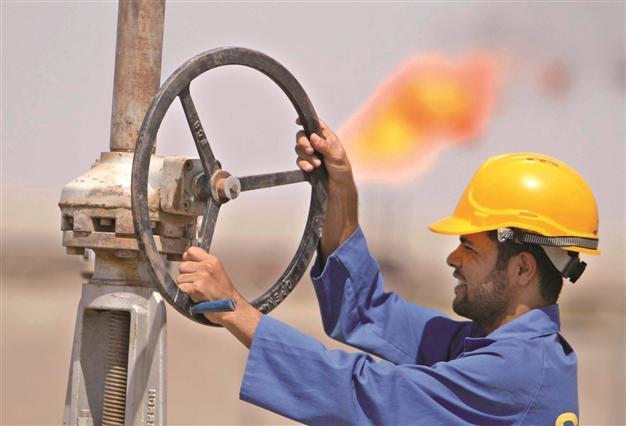Complex politics over Kurdish fuel
ANKARA - Hürriyet Daily News

A flame rises hind as flame rises at an Iraqi oil field. REUTERS photo
Oil in the Kurdish region of Iraq is attracting the interest of major oil companies and complicating the politics of the region by exacerbating existing sectarian and ethnic tensions. Iraq’s vast oil reserves give its long-suffering citizens the opportunity to recover from the effects of the American invasion and ensuing civil war, but could also be the catalyst for further internal quarrels and strife as well as external tensions.At 143 billion barrels, Iraq’s proven oil reserves are the third largest in the world. It also has probable reserves on the order of 214 billion barrels. It also has huge gas reserves. While it has fewer resources than the south, the northern region of Iraq, mostly under the control of the Kurdistan Regional Government (KRG), with Arbil as its capital, is hydrocarbon-rich, with estimated reserves of 45 billion barrels of oil. The world’s biggest oil firms are always eager for new sources, and led by American companies such as ExxonMobil and Chevron, a number of them have signed exploration and production contracts with the KRG. This has angered the Iraqi central government, which claims that the KRG has no right to make such deals according to the Constitution.
It is clear that hydrocarbon resources are seen by the leaders of the KRG as the key element in buttressing their autonomy and perhaps laying the foundations for eventual independence. On the other hand, understandably, Iraqi Prime Minister Nouri al-Maliki has shown little tolerance for actions that would take the management of the oil resources of northern Iraq out of his control. Not only would this substantially decrease the pool of resources available for the rest of Iraq, it could also hasten the disintegration of his fragile state.
Border tensions
On July 23, 2012, Iraqi army units were deployed in a show of force at the Rabia border crossing with Syria in northern Iraq. In response, the KRG sent a force of peshmerga, who barred the Iraqi troops from access to the border area, after a tense stand-off between the two forces. Al-Maliki accused the KRG of “violating the Constitution” by not yielding control of the border post to the Iraqi army. The incident was important not only because the Rabia border post is adjacent to areas of northern Syria, which have fallen under the control of Syrian Kurds, but also because it is located in the Nineveh governorate, home to one of the oil fields included in the KRG-ExxonMobil deal. Atheel al-Nujaifi, governor of Nineveh, warned that it had to be part of any deal, and claimed the same rights as the KRG. Since his comments, the situation has become even more complex, as the oil-rich province of Basra announced that it might also seek to become a federal region, along the lines of the KRG. For Baghdad, the escalating dispute with the KRG is both a key element of and a proxy for the broader political battle over the country’s unity and the authority of the central government.
The oil dispute has exacerbated tensions between Ankara and Baghdad on a range of issues. On July 17, 2012, Iraq warned Turkey against violating Iraqi airspace and territory as al-Maliki issued a warning to neighboring countries stating that Iraq would not remain silent in the event that a neighboring state violates Iraqi airspace. A couple of weeks later, the visit of Turkish Foreign Minister Ahmet Davutoğlu to Kirkuk on Aug. 2, following a visit to Arbil, also increased tensions. The Iraqi Foreign Ministry issued a statement claiming that Davutoğlu’s visit to Kirkuk was “not appropriate” and constituted “interference in the internal affairs of Iraq.” On May 21, 2012, Turkish Energy Minister Taner Yıldız and KRG Natural Sources Minister Ashti Hawrami jointly announced in Arbil that a one million-barrel-per-day capacity oil pipeline would be built to carry Kurdish oil to Turkey by August 2013. Immediately afterwards, al-Maliki’s adviser Ali Moussawi stated that “any deal had to abide by the Constitution and laws that govern relations between Baghdad and the Kurdish north.” In fact, long before this deal, Turkey’s Genel Energy was one of the first foreign oil firms to begin operations in the KRG and had emerged as one of the main players in the region.
The Obama administration is caught between its desire to secure Iraq’s stability and unity by supporting al-Maliki, and its close relationship with the Iraqi Kurds, while being aware of the interests of American oil companies.
Tension is rising in the Arbil-Baghdad-Ankara triangle, and political disagreements are being heightened by disputes over energy resources. The legal aspect of the issue is already complex, and will become even more so as the oil rush in the KRG is increasingly internationalized. While the dispute between Arbil and Baghdad should be resolved by normal parliamentary or judicial action, given the stakes involved and international interest in the outcome, a solution is unfortunately not in sight. The entry of American firms into the KRG has created an additional challenge for Washington and threatens to undermine the Obama administration’s efforts to maintain stability in Iraq prior to the American presidential election in November. Given the already volatile state of the region, a new conflict in the Middle East is the last thing that anyone should want.
















